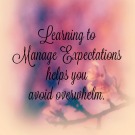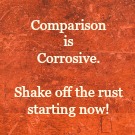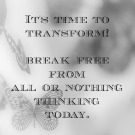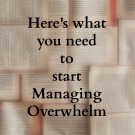There’s lots of talk in personal development and self-help land about finding your purpose and living with passion. And while I’m a huge believer in both, I get a little concerned when books and programs tout finding purpose and passion as some sort of external journey instead of what it really is: an internal journey that involves letting go of “how” and starting first and foremost with “why.”
Each of us are drawn to different profession and hobbies because they fill a deep need within us. But aside from paying the bills and allowing us to use our skills, how do hobbies and work fulfill us? They do it by giving us certain feelings: satisfaction, accomplishment, value, belonging. Doing work and hobbies that are closely aligned with our why allow us to express our truest selves and ultimately sets us free.
When we get distracted by focusing on “how” instead of “why,” we’re putting the cart before the horse. Over time, this can lead to burn out, discouragement, and that scattered angsty frustration of not really accomplishing anything even though you may be working really, really hard. It’s in these moments that stepping back to get in touch with your why can be helpful. Here are three things to remember as you go.
Your why can keep you going in tough times
When you’re struggling, you may start wondering if what you’re struggling with is actually worth it. It’s important to ask yourself if what you’re doing going to ultimately reward you in feelings, not just in external things such as money, possessions, or prestige. How is what you’re doing going to pay off in the long run? Is it going to pay off? Are you willing to keep going if you don’t know the answer? None of us get to do everything we want to do all the time but if you don’t believe deep down that what you’re going through is going to benefit you in some way eventually, step back and reevaluate whether you need to be part of a situation, or if you need to change course. If your “why” is strong enough you’ll know it by how you feel. Use those feelings as motivation to keep going or to change direction if it feels right.
Your why ultimately determines your approach and your actions
How many times have you slogged through something just to get it done? Do you continue to feel drained and defeated instead of motivated and energized by something you have to do? Stress is caused by perceiving that there is “too much” and “not enough,” such as too many things to do and not enough time to do them, or too much to do and not enough reward for doing them. A strong “why” will help you sort through what you must do and where to best use your energy. It will also help you power through your least favorite things. Look at what you dread doing and ask yourself how they relate to your “why.” Then figure out if you minimize or eliminate them. If you can’t get rid of them, work on trying to do them as efficiently as possible.
Your why will always lead you in the right direction (even if you can’t see that path yet)
One of the biggest challenges in our modern fast paced world is taking the time to not only discover your “why,” but then to also actually listen to what it’s asking you to do. It’s also terrifying sometimes to trust yourself. Making decisions that only make sense to you, that don’t go along with the crowd, and force you to step back and connect with yourself are all brave things. They’re even scarier when they don’t make sense but trust me, those thoughts and feelings are there for a reason, even if you can’t rationally understand where they’re leading you. Be sure to honor them, even if it’s only by writing them down in a notebook and allowing them to percolate for a while.
By letting go of how you’re going to achieve something instead of tuning into why you want it, you’ll be able to approach making a big decision, finishing a project, or even living with purpose with more energy, focus and less frustration. With practice, following your “why” will lead you to where you’re meant to be, which is a place of freedom and reward well beyond what you could have ever expected.






